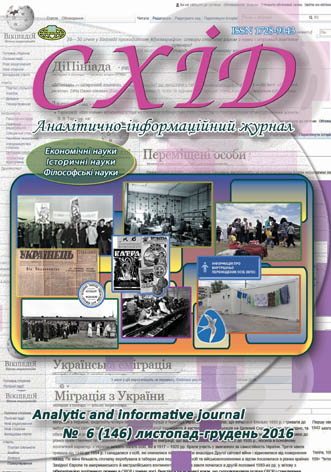Modern transformation of the subject as an ontological revolution
DOI:
https://doi.org/10.21847/1728-9343.2016.6(146).91795Keywords:
medieval culture, modern, critical philosophy, secularizationAbstract
In this article author substantiates a statement, according to which during a process of modern mind’s search for the substitution for religious principles of thinking and being transcendental conditions of experience of cooperation with the world have been stated and along with this a new type of subject-object relation has been designed (legitimized) and a new form of social reality has been created. There’s also been given opinions of Heidegger, Jean Grondin, N. Candlemas and Karl Jaspers on the formation and consolidation of secularization’s new senses and new subjects of action. It’s been showed that the foundation of a new being was drawn towards personality and immanence (Ego of Descartes, transcendental subject of Kant, Fichte’s I) and formed bases of anthropologic discourse. Exactly in Descartes’ philosophy a person becomes subject and also raises a question of subjectivity's principles; in Kant’s philosophy a person becomes a bearer of creative activity, a subject and “legislator” of the world order, which he is only able to cognize. Along with this, a formation of a new transcendental foundation for cultural forms, one of which was an immanent subject, didn’t happen in a form of a unified and directed at one goal process, but was a part of a common movement of secularization of Western civilization’s senses. A conversion to the immanent subject as an indisputable reason for cognitive processes and development of the science of a new age conformed to changes in European thinking, because of which philosophers stopped developing theoretical knowledge basing on the appeal to the divine reality and “logical” subject of antiquity and Middle Ages has been replaced by thinking and operating subject of a new reality, relations with which defined a civilization face of a modern age.
Downloads
References
Stepin, V.S. (1987), Scientific Revolution in the dynamics of cultural, University Press, Minsk (rus).
Gaidenko, P.P. (2003), Scientific rationality and philosophical mind, Progress-Tradition, Moscow, 528 p. (rus).
Ilyenkov, E.V. (1960), The dialectics of the abstract and the concrete in the scientific and theoretical thinking, Institute of Philosophy Academy of Sciences of the USSR, Moscow (rus).
Popovych, M. (2005), Century Red, ArtEk, Kyiv, 888 p. (ukr).
Porus, V.N. (2002), Rationality, science, culture, University of Russian Academy of Education, Moscow, 352 p. (rus).
Dobbelaere, K. (2004), Secularization: An Analysis at Three Levels, Oxford, 214 p. DOI: 10.3726/978-3-0352-6246-2
Taylor, Charles (2013), Secular Age [Translat.], Dukh i Litera Publishing, Kyiv, 664 p. (ukr).
Goldstein, Warren (2012), Secularization and the Iranian revolution, Neprikosnovennyy zapas, № 6, available at: http://www.nlobooks.ru/node/2943.
Sujet, subject; subject; story (2011), European philosophies Dictionary: Lexicon neperekladnostey [translat.], Vol. 1., Dukh I Litera, Kyiv, 148-173 (ukr).
Heidegger, Martin (2007), Nietzsche [translat.], Vol. II, Vladimir Dal, St. Petersburg, 457 p. (rus).
Grondin, Jean (2011), Turnaround in the thinking of Martin Heidegger [translat.], «Russian mir» Publishing House, St. Petersburg, 252 p. (rus).
Heidegger, M. (2016), German idealism (Fichte, Schelling, Hegel) and philosophical issues of our time [translat.], «Vladimir Dal» Publishing House, St. Petersburg, 496 p. (rus).
Sretenskiy, N.N. (2007), Leibniz and Descartes. Criticism of Leibniz general principles of the philosophy of Descartes: An Essay on the History of Philosophy, “Nauka” Publishing, St. Petersburg, 183 p. (rus).
Descartes, Rene (1992), Works, [translat.], “Nauka” Publishing, St. Petersburg, 656 p. (rus).
Jaspers, Karl (2014), Kant: life, work, impact, [translat.], «Canon +» &»Rehabilitation», Moscow, 416 p. (rus).
Foucault, M. (2007), Hermeneutics of the subject: The course of lectures at the College de France in the 1981-1982 academic year [Translat.], “Nauka” Publishing, St. Petersburg, 677 p. (rus).
Fichte, I.G. (1993), The basis of general science, in: Woks, Vol. 1, available at: http://filosof.historic.ru/books/item/f00/s00/z0000076/st000.shtml.
Downloads
Published
How to Cite
Issue
Section
License
Copyright (c) 2017 Victor Levytskyi

This work is licensed under a Creative Commons Attribution-NonCommercial-NoDerivatives 4.0 International License.
1. Authors bear responsibility for the accuracy of facts, quotations, numbers and names used.
2. Manuscripts are not sent back.
3. The publisher does not always agree with the authors' opinion.
4. The authors reserve the right to authorship of the work and pass the first publication right of this work to the journal under the terms of a Creative Commons Attribution-NonCommercial-NoDerivatives 4.0 International License. This license allows others to distribute (copy) the published work for non-commercial purposes, provided there is mandatory attribution to its authors and a link to the first publication in our journal.
5. The authors have the right to conclude separate supplement agreements that relate to non-exclusive work distribution in the form in which it has been published by the journal (for example, to upload the work to the online storage of the journal or publish it as part of a monograph), provided that the reference to the first publication of the work in this journal is included.

